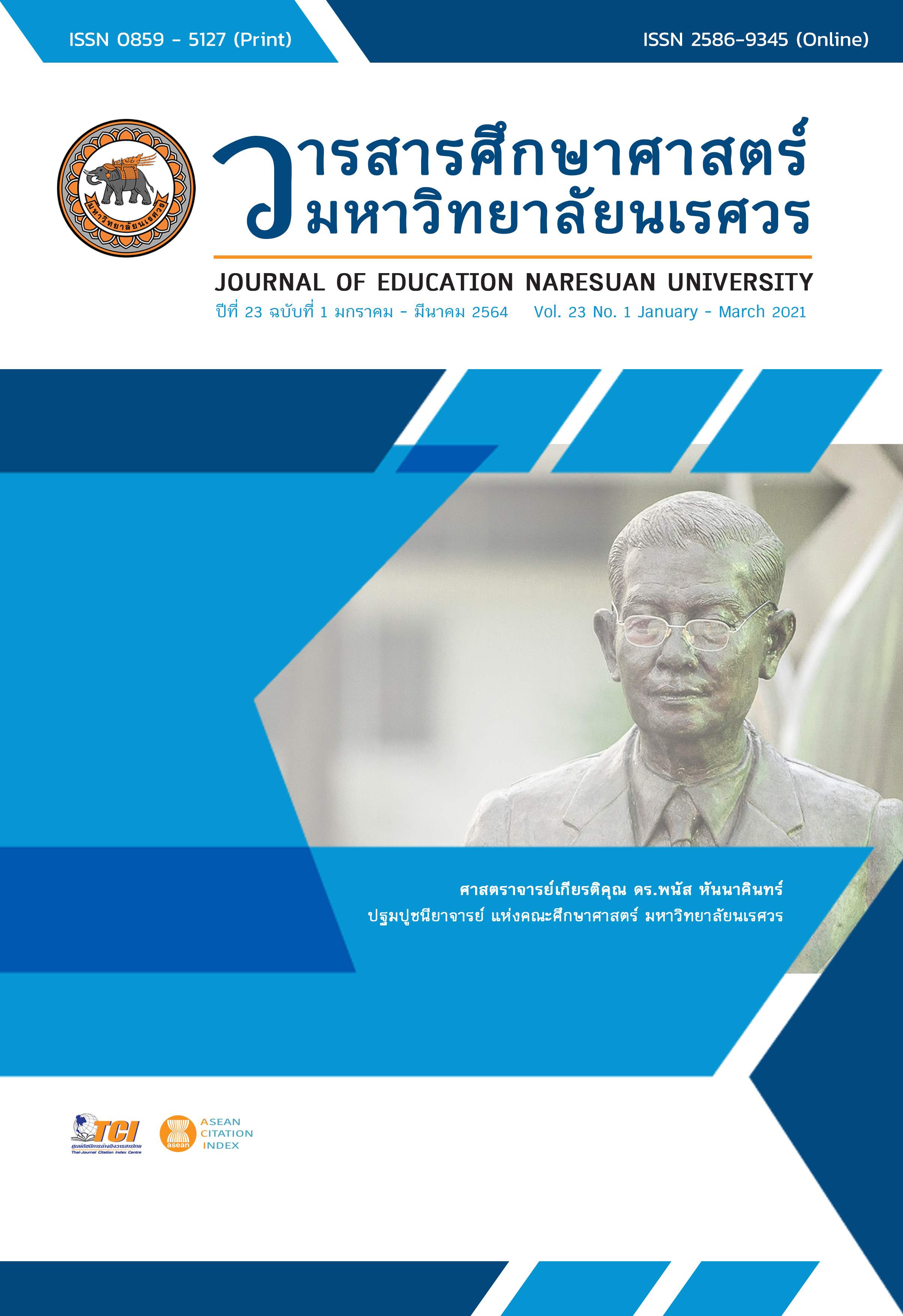THE EFFECTS OF LEARNING ACTIVITIES ON RATIO, PROPORTION AND PERCENTAGE BASED UPON STEM EDUCATION ON GRADE 7 STUDENTS’ COMPUTATIONAL THINKING ABILITY ผลการจัดการเรียนรู้ตามแนวทางสะเต็มศึกษาเรื่อง อัตราส่วน สัดส่วน และร้อยละ ที่ส่งเสริมความสามารถในการคิดเชิงคำนวณของนักเรียนชั้นมัธยมศึกษาปีที่ 1
Main Article Content
Abstract
The purposes of this research was to study the effects of learning activities on ratio, proportion and percentage based on STEM education on grade 7 students’ computational thinking ability. The participants were 28 grade 7 students at a small secondary school in Phitsanulok. The research was composed of 3 research instruments which are three lesson plans, worksheets, and computational thinking test. The data were analyzed by using analytic rubric. The results revealed that most students’ computational thinking is in excellent level. For each component of computational thinking, students’ ability in decomposition, pattern recognition and abstraction are mostly in excellent level. While students’ ability in algorithm is mainly in good level.
Article Details
The owner of the article does not copy or violate any of its copyright. If any copyright infringement occurs or prosecution, in any case, the Editorial Board is not involved in all the rights to the owner of the article to be performed.
References
Barcelos, T. S., Munoz, R., Villarroel, R., Merino, E., & Silveira, I. F. (2018). Mathematics learning through computational thinking activities: A systematic literature review. Journal of Universal Computer Science, 24(7), 815.
Cox, C., Birdy, R., Christian, S., & Anita, S. (2016). Using mathematics and engineering to solve problems in secondary level biology. Journal of STEM Education, 17(1), 22-30.
English, L. D., & King, D. T. (2015). STEM learning through engineering design: Fourth grade students’ investigations in aerospace. International journal of STEM education, 2(14), 1-18.
Kemmis, S., & McTaggart, R. (2000). The SAGE handbook of qualitative research. Thousand Oaks, CA: Sage.
Ministry of Education. (2017). Indicators and core curriculum for science learning (revised B.E. 2560) Basic education core curriculum BE 2551. Bangkok: The Agricultural Co-operative Federation of Thailand. [in Thai]
Palts, T., & Pedaste, M. (2020). A model for developing computational thinking skills. Informatics in Education, 19(1), 113–128.
Roungrong, P., Kaewurai, R., Namoungon, S., Changkwanyeun, A., & Tengkew, S. (2018). Computational thinking with Thai education. Panyapiwat Journal, 10(3), 322 – 330. [in Thai]
Sabkerd, S. (2016). Development of learning activities to enhance computational thinking with focus on STEM education learning management of the programming & application course for mathayomsuksa IV students of Anukoolnaree School (Master thesis). Maha Sarakham: Rajabhat Mahasarakham University. [in Thai]
Srithi, K., Supap, W., & Viriyapong, R. (2018). An action research on developing problem-based learning activities to enhance mathematical literacy in conic sections topic of students in grade 10. Social Sciences Research and Academic Journals, 13(37), 105-118. [in Thai]
Swaid, S. I. (2015). Bringing computational thinking to STEM education. Science Direct, 3, 3657-3662.
The Institute for the Promotion of Teaching Science and Technology (IPST). (2014). STEM Education. Bangkok: The Institute for the Promotion of Teaching Science and Technology. [in Thai]
The Institute for the Promotion of Teaching Science and Technology (IPST). (2017). Manual for teacher in science foundation course technology (computer science). Bangkok: The Institute for the Promotion of Teaching Science and Technology. [in Thai]
The Institute for the Promotion of Teaching Science and Technology (IPST). (2020). FOCUS in PISA. Retrieved June 11, 2020, from https://pisathailand.ipst.ac.th/issue-2020-53/ [in Thai]
Tibpaeng, R., Klineam, C., & Supap, W. (2019). The development of mathematical connection ability through context-based learning in ratio and percentage for tribesman students in grade 8. In The 48nd National Graduate Research Conference. Nakhon Pathom: Silpakorn University. [in Thai]
Tidma, P., Nakkuntod, M., & Kijkuakul, S. (2015). STEM education in topic of human systems to promote creative thinking of grade 8 students. Ratchaphruek Journal, 13(3), 71-76. [in Thai]
Wing, J. M. (2006). Computational thinking. Communication of the ACM, 49(3), 33-35.


